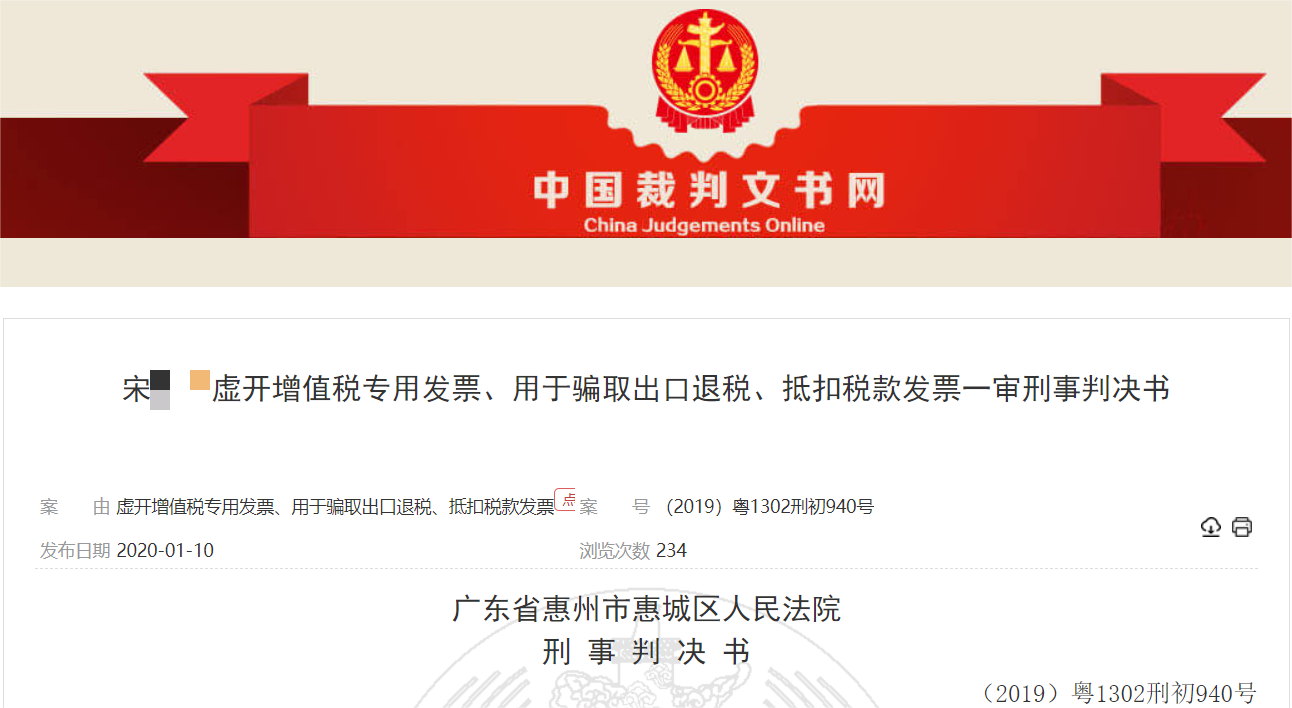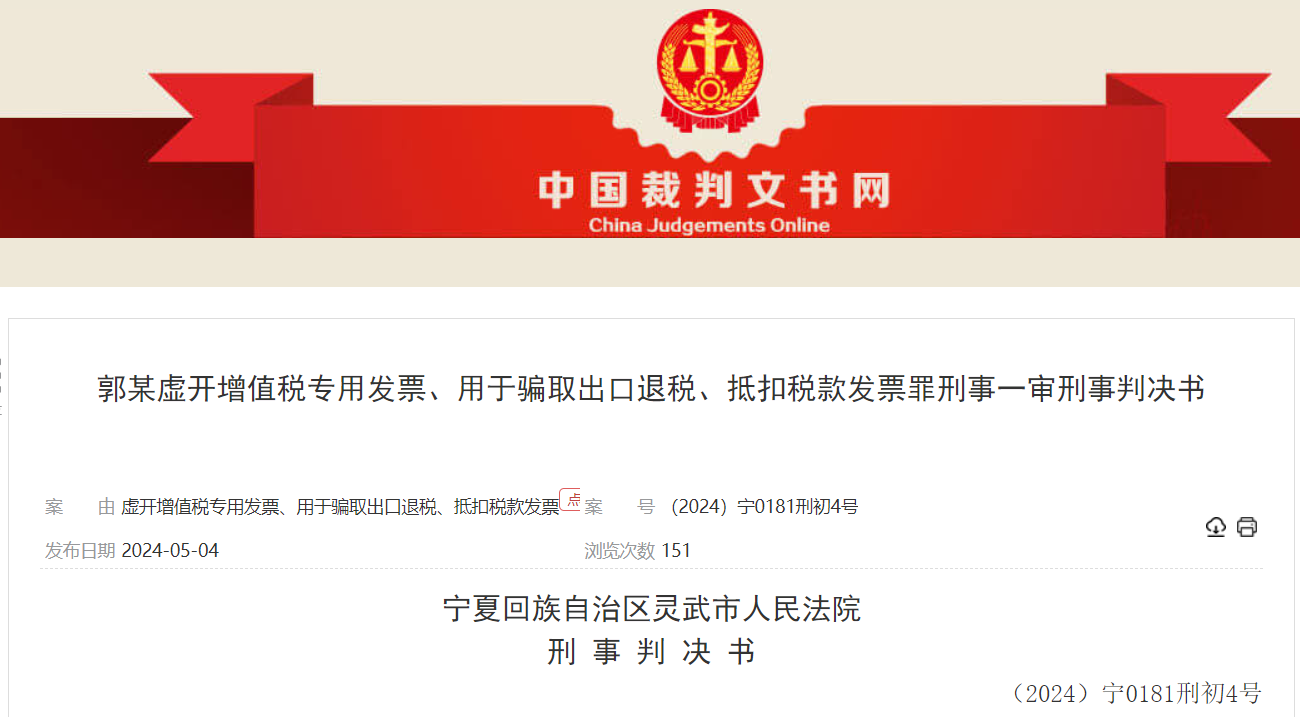Can the amount of unclaimed VAT for which invoices were fraudulently issued satisfy the condition of "no loss from tax fraud" to exonerate from criminal liability?
Abstract:Article 10, Paragraph 2 of the "Interpretation on Several Issues Concerning the Application of Law in Handling Criminal Cases Endangering Tax Collection and Management" (Judicial Interpretation [2024] No. 4) issued by the Supreme People's Court and the Supreme People's Procuratorate stipulates that if the purpose is not to defraud tax refunds and there has been no loss of tax revenue due to deductions, then the crime of issuing false special invoices shall not be prosecuted. This clarifies the conditions for exculpation from the crime of issuing false special invoices. In cases where the full amount of falsely issued special invoices has not been deducted, the undeducted portion objectively has not caused a loss of national tax revenue. Can this situation be applicable to Article 10, Paragraph 2 of the "Interpretation," advocating that the undeducted tax amount should be deducted from the total amount of the crime? The author selects one judgment each before and after the issuance of the Interpretation concerning the crime of issuing false special invoices and analyzes this issue and the underlying judicial logic through comparative case analysis.
Case of Song's False Issuance of Special Invoices: The Amount of Tax Not Actually Deducted Is Not Recognized as the Amount of Crime

1.The Facts of the Case
The judgment of the case of Song's crime of issuing false special invoices was made before the promulgation of the "Interpretation," with the case number (2019) Yue 1302 Criminal Initial No. 940.
In this case, the defendant Song, serving as a purchaser for a certain company, in order to save on the company's tax costs, repeatedly engaged in the act of having others issue false VAT special invoices for the company without any real transactions. From June 2016 to December 2016, Song purchased and actually received 22 falsely issued VAT special invoices from others, with a total tax amount of 370,000 yuan. Song used 19 of these invoices to offset taxes, with the amount of taxes deducted being 320,000 yuan. There were 3 invoices that had not been deducted yet, involving a tax amount of 50,000 yuan.
2.Opinions of the Prosecution and the Defence
The prosecution charged the defendant Song with the crime of issuing false special invoices, stating that the amount of the crime was the total tax amount of 370,000 yuan from the 22 falsely issued special invoices actually received by the defendant, which met the standard for a relatively large amount and should be held criminally responsible for the crime of issuing false VAT special invoices.
The defense argued that, in accordance with the guiding spirit of the "Second Batch of Typical Cases Where People's Courts Fully Play Their Judicial Functions to Protect Property Rights and the Lawful Rights and Interests of Entrepreneurs" released by the Supreme People's Court on December 4, 2018, the crime of issuing false VAT special invoices must have subjective intent and harmful consequences as elements. In this case, the portion of the amount that was not actually deducted does not meet the element of harmful consequences and should not be included in the amount of the crime. Although Song had the act of purchasing falsely issued invoices, not all of the falsely issued VAT special invoices were correspondingly deducted. Therefore, part of his false issuance behavior would not cause a loss of national VAT revenue. The portion of the amount that was not actually deducted did not subjectively intend to defraud taxes and also did not meet the element of harmful consequences; thus, it should not be included in the amount of the crime.
3.Conclusion and Reasoning
The court held that the defendant Song, in disregard of national laws, had others issue false VAT special invoices for him, with a total tax amount of 320,000 yuan, and his actions constituted the crime of issuing false VAT special invoices. In this case, the three falsely issued invoices that were not deducted, involving a tax amount of 50,000 yuan, should be considered in cases of issuing false VAT special invoices without actual purchase and sale activities. Since the issuer of the false invoices does not have the obligation to pay taxes, the amount of loss caused to the state should be calculated based on the amount that has been deducted by the recipient of the invoices at the tax authorities. Therefore, this amount of 50,000 yuan is not recognized as part of the crime amount.
In the case of Guo's issuance of false special invoices, the unactually deducted tax amount was recognized as part of the crime amount.

1.The Facts of the Case
The judgment for Guo's crime of issuing false special invoices was made after the Interpretation came into effect, with the case number (2024) Ning 0181 Criminal Initial No. 4.
In this case, the defendant Guo sought illegal benefits by introducing others to issue 232 false VAT special invoices in the name of Company A for Company B without any real goods transactions, with a total price including tax of 25.67 million yuan and a tax amount of 2.95 million yuan. Guo profited 50,000 yuan from this activity.
2.Opinions of the Prosecution and the Defence
The prosecution held that the defendant Guo violated national tax collection and invoice management system regulations by introducing others to issue false VAT special invoices, with a tax amount of 2.95 million yuan, which is a huge amount and should be held legally responsible for the crime of issuing false VAT special invoices.
The defense argued that most of the falsely issued invoices involved in the case had not been actually deducted, and the tax amount involved in the undeducted invoices was 2.24 million yuan. This part of the amount should be recognized as attempted crime.
3.Conclusion and Reasoning
The court held that the defendant Guo, with the purpose of profiteering and in violation of national tax collection and invoice management regulations, knowingly introduced others to issue false VAT special invoices without any goods purchase and sale transactions, with a tax amount of 2.95 million yuan. According to Article 11, Paragraph 1 of the Interpretation by the Supreme People's Court and the Supreme People's Procuratorate, this amount is considered large, and his actions constituted the crime of issuing false VAT special invoices. Regarding the defense's argument that "the undeducted 2.24 million yuan in the crime amount should be recognized as attempted crime," since the objective aspect of the crime of issuing false special invoices manifests as knowingly introducing others to issue VAT special invoices without any goods purchase and sale transactions, and all invoices involved in this case through Guo's introduction have been issued, the crime has been completed. The relevant defense argument is untenable and is not accepted.
The "Behavior" Rule Established by the Supreme People's Court and the Supreme People's Procuratorate is the Fundamental Reason Why Undeducted Tax Amounts Cannot be Exculpated.
Comparing the judgment results of the aforementioned two cases, it can be seen that before the Interpretation was issued, the undeducted amount of falsely issued tax could not be treated as part of the crime amount. However, after the issuance of the "Interpretation," the undeducted amount of falsely issued tax must be treated as part of the crime amount. Why does the "Interpretation," which claims to aim at narrowing the scope of the crime of issuing false VAT special invoices, appear to have expanded the scope of the crime? The reason lies in the establishment of basic judicial rules by the Supreme People's Court and the Supreme People's Procuratorate through the issuance of authoritative judicial opinions following the "Interpretation." These rules are based on "behavior" for conviction and "purpose + result" for exoneration.
The so-called "behavior" for conviction interprets the crime of issuing false VAT special invoices as a conduct offense. As long as the perpetrator has carried out the act of issuing false VAT special invoices, regardless of their purpose or whether there were harmful consequences, the crime of issuing false VAT special invoices is established. For example, the Supreme People's Procuratorate believes that "it should not be understood that constituting the crime of issuing false VAT special invoices requires the purpose of defrauding VAT refunds and the incriminatory element of causing VAT loss."
After the articles by the two high courts were published, I wrote an article to review and express concerns about the revival of "conduct offenses." From the current judicial practice over a period of time, the application of Article 10, Paragraph 2 of the Interpretation is very bleak, with almost no judgment documents citing this provision for exoneration. Instead, many new judicial judgment documents explicitly consider this crime as a conduct offense, practicing the rule of "behavior" for conviction. In the aforementioned two cases, the reason why the court in Song's case before the issuance of the Interpretation could exclude the undeducted tax amount from the crime amount was due to the court's discretionary understanding of the conditions for conviction in individual cases. The court could interpret this crime as an abstract endangerment offense or as a concrete harm offense or result offense, allowing them to directly determine from the perspective of constitutive elements that the undeducted tax amount did not constitute a crime. However, especially after the issuance of the Interpretation and the articles by the two high courts, this judicial discretionary space has been severely squeezed. If courts do not judge according to the "conduct offense," they will face the risk of being criticized for their duties, leading to the potential expansion of the scope of this crime and making it difficult for undeducted taxes to be exonerated.
Flexibly Apply the "Purpose + Result" Rule for Exoneration to Maximize the Rights of the Defendant.
The so-called "purpose + result" rule for exoneration, as stipulated in Article 10, Paragraph 2 of the "Interpretation," refers to the consideration that neither the perpetrator's purpose nor the harmful consequences are constitutive elements. However, they can serve as reasons to overturn the conclusion of establishing a crime. For a defendant to meet this rule for exoneration, two conditions must be met simultaneously: the first condition is the absence of the purpose to defraud tax refunds, and the second condition is the absence of causing harm by defrauding tax losses. Neither condition can be lacking.
In the aforementioned case of Guo, the undeducted portion could not be exonerated under Article 10, Paragraph 2 of the "Interpretation," because the fact that it was not actually deducted only satisfies the condition of "not causing tax loss due to deduction," but does not satisfy the condition of "lacking the purpose to defraud tax refunds." In other words, if the defense could provide evidence proving that Guo had another purpose for introducing the false invoices, or that the undeducted invoices corresponded to other special purposes or backgrounds, then the likelihood of applying the exoneration clause would significantly increase. For example, if the purpose of issuing the undeducted invoices was not for defrauding taxes through deductions but rather to help others inflate performance figures or secure loans for other purposes.
Therefore, in cases of issuing false VAT special invoices, the defense must consider both subjective purpose and harmful consequences elements and actively provide evidence to prove that both conditions for exoneration are met simultaneously. Only by doing so can the interests of the defendant be maximized.





